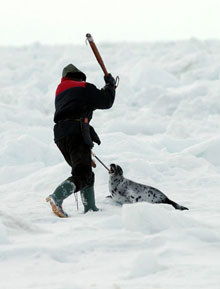 Today the European Parliament voted 550 to 49 in favour to ban the trade of all seal products (such as fur and omega-3) within the European Union. The new EU-wide legislation is meant to send a clear signal to Canada that their annual commercial slaughter of seals is "inherently inhumane."
Today the European Parliament voted 550 to 49 in favour to ban the trade of all seal products (such as fur and omega-3) within the European Union. The new EU-wide legislation is meant to send a clear signal to Canada that their annual commercial slaughter of seals is "inherently inhumane."
Stavros Dimas, European Commissioner for the Environment, welcomed the new ban and said that the new legislation "addresses EU citizens' concerns with regard to the cruel hunting methods of seals."
Caroline Lucas, MEP for the Greens in the UK, said that "today, nearly one million seals are slaughtered annually in commercial seal kills around the world", and that this new legislation will help end "one of the most vile examples of animal cruelty."
The new ban will come with exceptions for Inuit communities and other indigenous peoples from Canada and Greenland which will be allowed to continue their traditional hunts. But they are not allowed to participate in any large-scale trade of seal products within EU.
The International Fund for Animal Welfare (IFAW) applauded the new legislation and said it was a major victory in the organizations 40 year campaign to end Canada’s commercial seal hunt.
Canada and Norway have warned that they will take the European Union and its 27 member nations to the World Trade Organization if they agreed on a ban on seal product imports.
It is feared that the new EU ban will overshadow any other topics during the EU-Canada summit in Prague this week. The summit is meant to launch negotiations for a new economic and free trade agreement between Europe and Canada as well as strengthening efforts to build a low-carbon global economy.

Recommended Comments
Join the conversation
You can post now and register later. If you have an account, sign in now to post with your account.